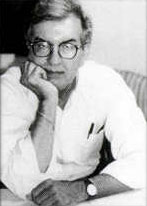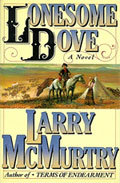April 24, 2006
History can make for great TV. For if we don't dramatize the past, then we're just...
Doomed to rerun itFrom The Dove to the Mountain
The beginning of Larry McMurtry's television empire
 |
This was Lonesome Dove.
As most of the greatest of things, Lonesome Dove the miniseries almost didn't happen. Lonesome Dove's first incarnation was as a movie script written my Larry McMurtry in 1971. It was intended to star John Wayne, James Stewart, and Henry Fonda, with Peter Bogdonovich directing. Wayne turned it down and so the project was shelved. After ten years of waiting, McMurtry bought the script back and decided to adapt it into a novel. Shortly before the novel went to press, producer Suzanne De Passe was in Tuscon, Arizona where she and her good friend Gloria Stein decided to go out for Mexican food. Their friend Leslie Silco came along and brought along a friend, Larry McMurtry. McMurtry and De Passe hit is off instantly and made arrangements to have lunch together when both were in Los Angeles. It was at this lunch that De Passe asked if McMurtry happened to have anything lying around that he might like to see produced. He said he had just finished a novel that was just about to go into publication and would she like to read it? She eagerly said yes.
In an interview, De Passe describes receiving her copy of the novel Lonesome Dove: "It was rolled in on flatbed dollies of boxes and boxes of reamed papers. It was in unbound galleys". The novel in its bound state is about 935 pages, single-spaced. This "looked like about 200 Manhattan telephone books". She started taking home handfuls of the pages at night. She wasn't even halfway through and she knew she wanted it. She bought the production rights for an unprecedented $50,000. No sooner had she closed the deal, the phone calls started rolling in...Westerns were out, the book had been shopped all over town and no one wanted it...
 |
It paid off. Lonesome Dove was the highest-rated miniseries of the last decade. It won 7 Emmy Awards. It spawned not one, but two television series (Lonesome Dove: The Series in 1994 and Lonesome Dove: The Outlaw Years) as well as two sequels (Return To Lonesome Dove and Streets of Laredo) and two prequels, one of which just began filming in New Mexico and will star Val Kilmer (Comanche Moon).
| "I pointed out things that were idiotic in the script", McMurtry has said, "but I've never seen the series." |
Since Lonesome Dove, McMurtry has seen the majority of his 18 novels turned into films or television miniseries. His latest glory is the winning of the Academy Award for Best Adapted Screenplay for Brokeback Mountain. He continues to rejuvenate a genre that was once called all but dead. "Every time they adapt one of my novels," he says, "they say it's too slow, too talky, too dark. They said it with The Last Picture Show, Terms of Endearment, Lonesome Dove, and Streets of Laredo. But Hollywood had never grasped what audiences know: Tragedy had always played".
Keep knowin' us Larry. Because we sure as hell can't quit you.
Email the author.
Return to Season 2, Episode 15.
All written content © 2005-2006 by the authors. For more information, contact homer@smrt-tv.com
